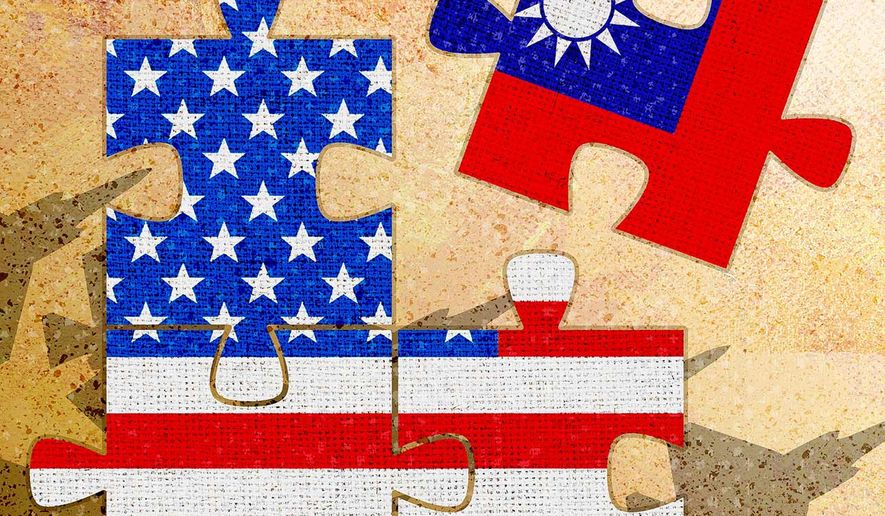OPINION:
With all of the talk this year about China possibly attacking Taiwan, you might think that the Biden administration, smarting from failures from Afghanistan to Russia, would have already taken all of the quick and easy steps it could to beef up defenses in the Pacific. But you would be wrong.
Taiwan wants to buy more missiles, aircraft, undersea equipment and ammunition from the United States. Yes, we wrote “buy”— unlike many U.S. partners, Taiwan pays cash for its arms instead of expecting our taxpayers to foot the bill. But the Biden White House is slow-walking Taiwanese requests to buy arms to the detriment of our own defense and industry.
But there are even simpler steps that Washington can take to deter China. One doesn’t need to be a military genius to know that concentrating more military power through alliances is a good way to increase one’s chances of victory on the battlefield, or better yet, persuade the enemy not to start a fight in the first place. So it might surprise most Americans to know their military has almost no serious coordination with Taiwan’s military, even though we might have to fight China together.
When U.S. aircraft patrol around Taiwan, they are instructed not to communicate with Taiwanese military forces. Neither side benefits from the other’s information. Taiwanese fighter jets sold by America lack access to the Link 16 tactical military data network that even dubious allies like Turkey have been able to access for more than a decade.
U.S. ships do not make port calls in Taiwan, despite a law Congress passed enabling them to do so, and the Pentagon doesn’t allow Taiwanese ships and aircraft to engage in war games or defensive planning with our armed forces. Each nation’s flag officers are strangers to each other.
Taiwan is allowed to have just a few officers posted to U.S. Indo-Pacific Command in Hawaii, and they are not integrated into the chain of command or the support staff.
A hotline from Taiwan to that command is a single phone line. That’s a far cry from a robust system to share data about emerging threats, incoming attacks, accurate targeting, and battle damage assessments. We are depriving Taiwan and ourselves of the only feature with which we can hope to beat China in a conflict — superior information and the practices to exploit that information on the battlefield. Other countries take their lead from our reluctance. Australia, the Philippines and Singapore have only very limited ties to Taiwan’s military.
Coordination and even basic communication between Taiwan’s military and that of its most important neighbor, Japan, are basically nil. The Japanese island of Okinawa, which hosts major U.S. forces, is just 400 miles from Taipei. Instead of a logical center for theater-wide command and control in a crisis, it would be an information black hole to Taiwan. When Japan and Taiwan talk about military maneuvers, it is often in the form of complaints about each other’s patrols of disputed islands that are unpopulated and of limited relevance.
Japan might be willing to take a different approach if America led. Tokyo has increased its defense budget in recent years and is contemplating an even larger increase that might result in nearly twice the annual spending level of recent decades. Japanese officials have also been less hesitant to talk about the likelihood Japan would have to be drawn into a war if China attacked Taiwan or other Pacific countries.
But without leadership from Washington, governments in East Asia prefer to avoid being singled out by China for more criticism and coercion. The resulting situation is as if America promised to keep the peace in Western Europe during the Cold War, but slow-walked arms sales to NATO and refused to form a unified military command or even practice with European militaries.
Failing to liaise seriously with Taiwan also impacts the politics of the Taiwanese military. It empowers a faction that doesn’t want to see China for the critical and looming threat that it is, and undercuts those in the national security establishment that want to be ready to fight and try to coordinate efforts with would-be allies.
The stakes couldn’t be higher. A conflict with China could dwarf every American war since World War II. Preventing such a disaster requires determined action now to convince Beijing that the free world has its act together sufficiently to call into doubt China’s success.
As former Secretary of State Mike Pompeo said while visiting Taiwan last week, the free world has to choose whether we want “a free 21st century, and not the Chinese century of which Xi Jinping dreams.” Beginning to coordinate the military assets we already have among our friends and ceasing to treat those friends like strangers is an essential and low-cost way to start.
• Stephen Yates is a senior fellow and the chair of the China Policy Initiative of the America First Policy Institute. He was a deputy national security adviser in the Bush administration. Christian Whiton is a senior fellow at the Center for the National Interest. He was a State Department senior adviser in the Bush and Trump administrations.




Please read our comment policy before commenting.